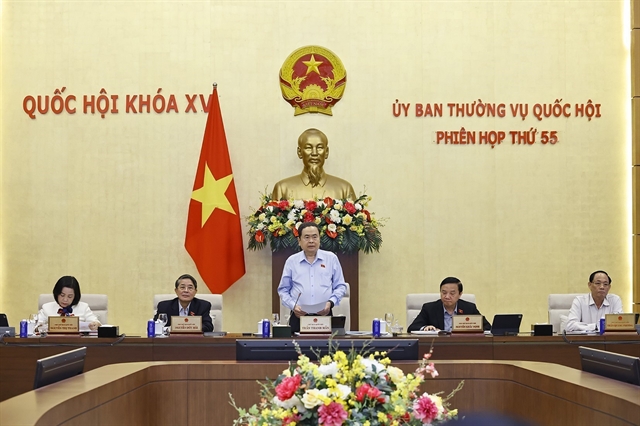 Economy
Economy

For businesses, to resume operation, capital for production is one of the most important issues besides the shortage of labourers.

|
Phong Phú-Phú Yên International Investment JSC's workers maintain operations amid the pandemic. Financial issues are the most important for businesses to reopen. VNA/VNS Photo
By Mai Hương
HÀ NỘI — After the pandemic is gradually put under control in many provinces, local authorities and businesses are striving to get the economy back to normal. However, for businesses, to resume operation, capital for production is one of the most important issues besides the shortage of labourers.
Data of the General Statistics Offices has revealed alarming numbers, that in the first nine months, about 85,500 new enterprises entered the market, but the number of firms withdrawing from the market reached 90,300, averaging 10,000 per month.
This is also the first time the number of dissolved enterprises was higher than the newly registered businesses.
According to Chu Tiến Dũng, chairman of HCM City’s Business Association, in the past three months, the city’s businesses have made great efforts to both control the disease and maintain production. However, in the new context which requires rapid restoration of production, they are facing a lot of challenges ranging from the shortage of labourers, supply chain disruption, increases in input material prices and especially shrinking cash flows.
With more than 95 per cent of Vietnamese enterprises of small and medium size, these are also the common difficulties facing businesses across the country
Việt Nam Mineral Powder JSC, a firm specialising in exporting mineral powder to India, Bangladesh and Sri Lanka, has seen good growth in the past 10 years, but the pandemic has driven down its exports by 60-70 per cent.
Together with input price hikes, soaring logistic costs and cancelled orders have made the company lose nearly VNĐ60 billion (US$2.6 million) in revenue in the past month.
“So to get back to work, we need working capital most. The difficulties caused by the pandemic along with the cost of disease prevention are eroding our resources,” said Nguyễn Vinh Huỳnh, the company’s deputy director.
The company is planning to borrow VNĐ10 billion at an interest rate of 7 per cent per six months to finance its operations in the next two quarters, Huỳnh added.
Đào Phan Long, chairman of the Vietnam Association of Mechanical Industry, said financial issues are the most pressing for businesses to reopen. Enterprises are paying for a lot of expenses which range from COVID-19 testing, 3-on-site production, payment for employees to bank loan interest and land rent, while output remains limited due to lockdown measures.
Many businesses suffered the dilemma that the more they produced, the more they lost, being forced to stop operations or pushed to the verge of bankruptcy.
“The sharp decrease in revenue and the increase in expenditure is eroding the financial resources of enterprises, especially small and medium ones (SMEs). Large and reputable businesses can easily get a bank loan but this is difficult for SMEs,” Long said.
Optimistic signals
To quickly put the economy back on track, the Party and Government has issued and supplemented many policies to support labourers and enterprises.
Recently, banks are also being flexible to consider unsecured loans based on cash flow management and continue improving the lending process and procedures to shorten the loan approval time.
Meanwhile, the central bank has signalled that it will continue promoting solutions to remove difficulties for borrowers hit by the pandemic and concentrate capital to promptly meet the demand of the economy at reasonable terms and interest rates.
Data of the State Bank of Việt Nam (SBV) showed the credit of the whole banking system increased by 7.42 per cent as of early October compared to the end of last year, even higher than the 5.48 per cent growth rate in the same period of 2020.
This was a good result as it has reflected not only the capital absorption of enterprises and the economy, but also shown the demand for capital of the economy still increased amid the pandemic.
“There are bright signs in credit expansion,” said Nguyễn Tuấn Anh, director of SBV’s Credit Department for Economic Sectors.
Anh highlighted 4/5 sectors witnessed high credit growth compared to the economy, including agriculture and rural development with a growth rate of 8.54 per cent, SMEs 7.05 per cent; export 7 per cent, supporting industry 18.9 per cent and high technology application 24 per cent.
Besides banks, SMEs can access capital from funds, such as the Small and Medium Enterprise Development Fund (SMEDF) under the Ministry of Planning and Investment which provides funds for innovative start-ups, SMEs, enterprises participating in industry clusters and value chains.
According to Bùi Hoàng Tùng at the fund’s loan operations division, the fund is working with experts to help SMEs improve their business capabilities, reduce risks and aim for sustainable development.
Tùng noted some advantages and incentives when borrowing from this fund including lower interest rates than direct loans from banks and fixed rates which can be reduced during the lending period. Meanwhile, the fund will advise and assist businesses in doing loan procedures and early repayment is free.
Besides loans, the Ministry of Finance has advised the Government to reduce corporate income tax, VAT, personal income tax and waive fines for late tax payment for businesses facing difficulties. This total support package is about VNĐ21.3 trillion ($926 million).
In an online meeting with HCM City’s citizens, Phan Thị Thắng, Vice Chairwoman of HCM City People’s Committee said corporate income tax is expected to drop by 30 per cent for businesses with revenue not exceeding VNĐ200 billion; value added tax (VAT) to decrease by 30 per cent from October 1, 2021 to December 31, 2021 for businesses in a number of fields.
“This is good news for businesses and we expect the Government will soon enact these policies,” she said.
Fiscal measures such as extension of loan payment and insurance premium payment, corporate income tax reduction, exemption of fines on late payment cannot help businesses recover immediately, but they will provide a solid support, helping businesses save more cash to maintain production and recover. — VNS
Phong Phú-Phú Yên International Investment JSC's workers maintain operations amid the pandemic. Financial issues are the most important for businesses to reopen. V




